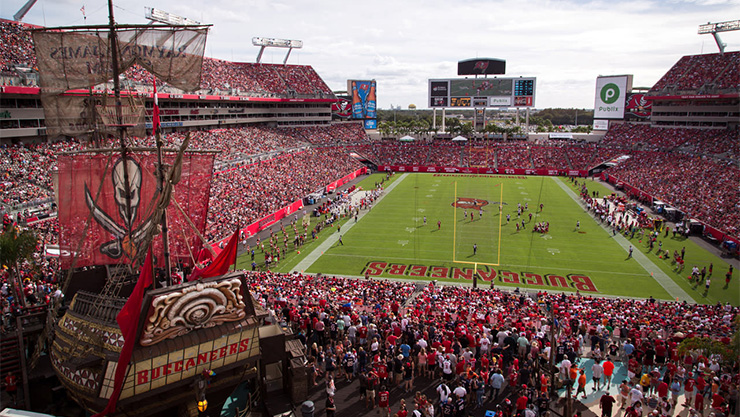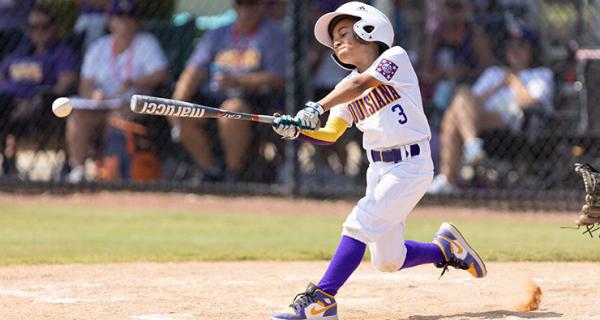Tampa Preps for Super Bowl During ‘Historic Moment’
Tampa is set to host the hometown team in the big game before turning attention to another major event: WrestleMania.

A stretch of inclement weather in California years ago and Tom Brady’s stormy relationship with Patriots coach Bill Belichick are why it seems especially sunny in Tampa this week.
As the region prepares to host Super Bowl LV on Sunday, it is doing so under the most unusual of circumstances. And that’s not even taking into account the pandemic—but we’ll get to that.
Back in 2016, while Brady was still in his heyday with the New England Patriots, the NFL awarded Los Angles this year's big game. But by 2017, unusually persistent storms in California delayed the opening of Los Angeles’s new stadium a year. The NFL called an audible, and awarded Tampa Super Bowl LV while L.A. got the handoff to 2022.
Meanwhile, Brady’s legendary run in New England came to an end last year. The quarterback turned into a snowbird, heading south to Florida. Despite a rough opener, Brady added to his legacy by leading the Bucs to three straight road playoffs wins. The reward is Tampa Bay will be the first team playing in its home stadium in the Super Bowl.
“I don't know if we could have dreamed it up, but it's a very exciting reality that we're all living,” says Jason Aughey, senior vice president of sports tourism at the Tampa Bay Sports Commission.
While it took a series of unusual events to lead to this being the first Super Bowl featuring a hometown team, the buildup to the game will be highly irregular.
What is one of the world’s largest sporting events is being forced to scale down. Only recently was it announced 22,000 spectators, 7,500 of whom will be frontline health responders, will be in Raymond James Stadium on Sunday. With a smaller number of tickets—hard enough to come by anyway—it is just as well that there will be fewer out-of-town fans because of the hometown factor.
COVID-19 restrictions will certainly affect the event’s economic impact, normally worth well over $100 million. But Aughey doesn’t discount the game’s positive contribution to the community.
“The economic impact will be sizable and significant and do a lot for our tourism partners,” he says.
Beyond putting many furloughed or displaced hospitality staff back to work, there are also tangible positives stemming from the Super Bowl, particularly with the Tampa Bay Buccaneers' presence driving local interest to “another level,” Aughey notes. Many non-game activations and events are drawing huge interactivity and interest, he adds.
“I think the sense of pride that you know the community feels has been remarkable; the momentum and energy has been palpable,” Aughey reports.
All safety precautions are being taken, from transportation to hotels to off-site ancillary events. Aughey and company know health and well-being will be top of mind for all visitors.
Should all go as planned, surviving and thriving amid challenges will reinforce the already strong bond between the NFL and Tampa. Aughey’s top measurement for an event’s success is whether it returns. The fact that this will be the city’s fifth Super Bowl speaks volumes.
Ready to Rumble
In some ways, the Super Bowl may be a warmup act. Ten days out from the game, Tampa Bay Sports Commission officials, including Aughey, were attending to another major event coming to town: WrestleMania.
WWE and local officials recently held the first of what will be many planning calls leading to March’s two-day spectacular also at Raymond James Stadium. Tampa was to host the event last year before the pandemic moved it to WWE’s Performance Center in Orlando with no spectators.
This year’s WrestleMania was to be in Los Angeles, but again, Tampa got the nod—this time due to California’s restrictions on large gatherings. It will be some time before a determination is made for how many fans will be in the stadium. Reports suggest WWE is hoping for at least 20,000 spectators each night.
Hosting WWE’s marquee events has been a long time coming, and special given how close it came to happening in 2020.
“I’d say 95% of the playbook had been executed from an operations side” Aughey says of last year. “We have been working for more than a decade to try to land that event.”
Remarkably, there’s more to come for Tampa. Just look at this list of upcoming major sports events:
- 2021 NCAA Division II Men’s and Women’s Cross Country Regional and Championships
- 2021 NCAA Division II Women’s Volleyball Championship
- 2022 SEC Men’s Basketball Tournament
- 2023 NCAA Men’s Frozen Four
- 2023 NCAA Women’s Volleyball Championships
- 2025 NCAA Women’s Final Four
- 2026 NCAA Men’s Basketball First and Second Rounds (March Madness)
But first, there are the Super Bowl and WrestleMania to keep Aughey busy with 14-hour days.
“There is no complaining from our side,” he says. “We're very fortunate to have these two major events back to back. We’re living in a historic moment.”








